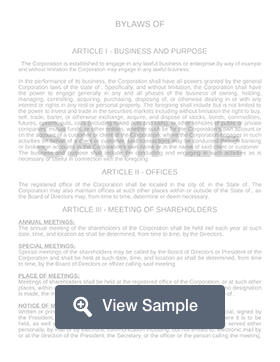What Are Corporate Bylaws Form
A corporate bylaws are rules and procedures that a business uses in the course of operations. By documenting its corporate bylaws, a business can better ensure consistency and continuity in its business practices. Corporate bylaws are generally reviewed and amended every few years. They are also known as company or corporation bylaws.
What are Corporate Bylaws?
Corporate bylaws are used by a business or corporation. They are a rule or law that is specific to the company or organization. Bylaws ensure that everyone is on the same page regarding the expectations of the company and how the organization will be run.
A document outlining corporate bylaws should include the name of the organization, their purpose or mission statement, and their location. The members of the organization or the board of directors is also typically listed on a bylaws document. This is important, as these people are usually the ones enforcing the bylaws. The bylaws should be maintained as a part of a company's corporate records.
Finally, the bylaws should be listed. They should be very specific. This ensures that everyone knows the specific rules and how to follow them. Typically, bylaws should be reviewed and amended as necessary every 5 years.
Corporate bylaws are also known as Bylaws or Company Bylaws or Corporation Bylaws.

Create a What Are Corporate Bylaws in minutes with our professional document builder.
Corporate Bylaws vs. Articles of Incorporation
Articles of Incorporation state the basic structure of a company. They will typically include information about the person organizing the corporation, the number of share the corporation can issue, the names of the members of the Board of Directors, and the location of the corporation. Articles of Incorporation are filed with the state.
Corporate bylaws are an internal document that lays out the rules and day-to-day operations for a corporation. Bylaws are specific to each organization, but typically include: an organization’s name, purpose, and location, board members, board of directors, committees, corporate officers, meetings, conflicts of interest, and amending bylaws. Bylaws typically do not need to be filed with the state.
Corporate Bylaws Template
Every organization will have a different set of bylaws that are tailored to their particular needs. Bylaws may include:
-
Name, Purpose, Location of Organization - List reason for organization’s existence, principal place of business
-
Members - Detail different types of members, selection process, voting rights, procedures for discipline and removal.
-
Board of Directors - Discuss composition of board, number of directors, how vacancies should be filled, duties of directors, details of how the chairman of the board is selected
-
Committees - Detail any special or executive committees, how they are appointed, and what their duties are.
-
Officers - Discuss selection of officers (president, vice president, secretary), specific duties of officers, length of term of office, voting procedures, procedures for removal and filling vacancies in case of earlier resignation
-
Meetings - Indicate any annual meetings, regular meetings, shareholder meetings, or special meetings and requirements for notifying attendees. Specify how many members constitute a quorum (generally the entire board need not be present).
-
Stock - What stock classes will be offered, total number of stock certificates that can be issued, if a transfer agent will be used
-
Money Lending - Whether the corporation can lend money to its officers, directors, or employees.
-
Conflicts of Interest - Include a provision that indicates what should be done when there is a conflict of interest. This protects the organization from potential IRS penalties.
-
Amending Bylaws - Rules that explain how the bylaws can be amended.
Legal Considerations for Corporate Bylaws
Corporate bylaws are subject to state specific laws. Many states specify that a board must adopt bylaws. The contents of the bylaws are up to the individual corporation. If you have questions about your state's laws, you should seek legal advice.
When do corporate bylaws come into effect?
Corporate bylaws are usually adopted by the Board of Directors at their first meeting. The bylaws will guide the company’s internal decision-making throughout its existence.
Can corporate bylaws be amended?
A corporation’s bylaws can be amended. Usually, the process to amend bylaws is explained within the bylaws themselves. Amended corporate bylaws generally involves proposing changes during a scheduled board of directors meeting and holding a vote. Any changes to a corporation’s bylaws should be officially documented within the written bylaws.
Nonprofit Bylaws
If your organization or business happens to be a non-profit, utilize our nonprofit bylaws template.
